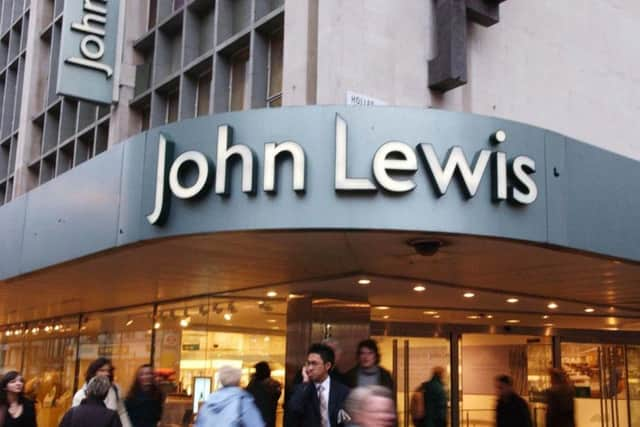John Lewis boss confident amid retail challenges
This article contains affiliate links. We may earn a small commission on items purchased through this article, but that does not affect our editorial judgement.


Nickolds, 12 weeks into the job and the first female MD in the history of the “Never Knowingly Undersold” chain seen by many as emblematic of Middle Britain, said customers are less financially confident.
She said also that no retailer can be immune from the slide in the value of sterling since last June’s Brexit vote that has pushed up the cost of imports – with 70 per cent of John Lewis’s products being from overseas.
• READ MORE: John Lewis bonus ‘lowest since 1950s’
Advertisement
Hide AdAdvertisement
Hide Ad

In addition to that, she cited the systemic change on the high street whereby customers are increasing shopping from their mobile phones – not infrequently while walking round the stores – which the retail sector has to address.
“There will be profound change and there will be (retail) casualties,” Nickolds said. “Of that, I’m sure. To some extent, ‘twas ever thus. It’s tough. There’s no doubt that structurally the returns in retail have got less.”
Like Lord Wolfson at fashion retailer Next, Nickolds said the evidence is that consumers are spending more on events and entertainment rather than shopping.
On the wider backcloth, she said: “We are seeing customers less confident about their financial position. How long will it last? If you know the answer to that, please tell me. It’s so difficult to judge. Our 12 million customers are savvy but conscious about what is happening in an economic sense.


“Nobody is immune to the broad macro-economic environment. It’s prudent for us to assume that we have to work harder than we have ever had to work to take a disproportionate share of money customers are spending in retail.”
Wolfson said he expected prices could rise as much as 5 per cent in 2017 as a result of the slide in the pound. Might John Lewis follow? “It’s yet to be clear how much can be passed on (to the customer),” Nickolds said. But input prices are unquestionably moving ahead.”
Nickolds joined John Lewis 23 years ago as a graduate entrant in the haberdashery department in its store in Oxford Street. She is grateful for inheriting a business from John Lewis veteran Andy Street “in good shape” to meet the challenges. The 152-year-old brand is strong as ever, and profitability and sales are resilient.
Advertisement
Hide AdAdvertisement
Hide AdHowever, the MD confirmed there would be more job losses across the group this year, following from the announcement last month that nearly 400 roles were going, but declined to give numbers. Sir Charlie Mayfield, chairman of the John Lewis Partnership, had already warned at the group’s results earlier this month that there would be a “continual gradual decline” of jobs.
His lieutenant buys into the idea that the new normal in the high street is twin-pronged: be up with or ahead of the latest curve societal changes – electronic interaction on virtually everything including shopping, and providing customers not merely with products but “a service” as a result.
More staff are going to be brought out of the back office to interact with customers on the shop floor; fewer new John Lewis stores are going to be added to the 48-store UK estate – which includes Edinburgh, Glasgow and Aberdeen – in the coming years as a result of the march of digital shopping.
• READ MORE: Thousands of retailers facing financial collapse
Nickolds, a self-proclaimed “shopping and design junkie”, cites a couple of key targets. She would like 50 per cent of John Lewis’s transactions to be done online by 2020, up from 50 per cent currently.
And by the same year she also wants 50 per cent of products sold in her stores to be only available in John Lewis, either through carrying the JL band or because the company is in partnership with exclusive brands. That current figure is 38 per cent. “Customers are telling us they want this - they want things they can only buy from us,” said Nickolds.
One of her big ideas is for shopping to be “thoughtful and personalised experiences”, also using the word “immersive”, so electronic shopping doesn’t take away the human interaction of the trip to the store. This will include more “experiential” launches, following on from the success of its rooftop pop-up restaurant The Gardening Society, on top of their Oxford Street store.
Also on the radar is for John Lewis specialist staff to increasingly see what customers have been buying to perhaps suggest “accessories” that add to the idea of a “service” being provided, not just a product. Or as Nickolds said: “We don’t want to sell people a mattress, but a good night’s sleep.” In short, the times are challenging, but John Lewis’s new chief is in anticipatory mode.